Private Label Food Packaging: Leverage Co-Packing to Scale Your Brand Faster
Leave a CommentPrivate label food packaging allows companies to differentiate their products on store shelves without the overhead of in-house production.
By outsourcing packaging tasks to an experienced co-packer, brands can focus on core competencies—product development, marketing, and distribution—while ensuring that their packaging meets strict industry standards for safety and quality.
What Is Private Label Food Packaging?
Private label packaging refers to producing and labeling a food product that another company sells under its own brand name. This model allows retailers, wholesalers, and established food businesses to quickly expand product lines, enter new markets, and meet evolving consumer preferences.
The Role of a Co-Packer in Private Labeling
A co-packer partners with your team to handle aspects like portioning, blending, seasoning, and packaging finished products. This collaboration reduces the capital investment, labor, and infrastructure required for in-house operations.
More importantly, an experienced co-packer brings industry knowledge, scalable capacity, and reliable quality controls. This combination ensures consistent output and speeds time-to-market—key factors in staying competitive.
Our Real-World Example
A well-known snack brand wanted to test a new product line without tying up internal resources. By partnering with Econo-Pak, a co-packer experienced in producing and packaging dry snack mixes, the brand rapidly launched a private label offering.
We managed ingredient sourcing, blending, and flexible packaging formats, enabling the brand to meet retailer demand on schedule. As the product gained traction, we scaled up production seamlessly, reducing both lead times and costs.
Scale with Econo-Pak
Private label food packaging, when supported by an experienced co-packer, allows you to focus on growth, new product development, and market expansion. At Econo-Pak, our flexibility, rigorous quality control, and deep industry expertise ensure that every package meets exact standards—no matter how quickly your needs evolve.
By partnering with Econo-Pak, you gain a trusted resource that can help you achieve your branding goals, enter new markets with confidence, and scale production efficiently. Don’t just keep pace with the industry—let Econo-Pak help you lead it.
Let's start scaling.
Is your demand outpacing your ability to package your own product? Then consider outsourcing with Econo-Pak.
With over 40 years of experience working with both small brands and Fortune 500 companies, we are capable of handling your specific dry food product.
Get in touch with our team for a fixed-price quote for your project.
Press Release: Econo-Pak Announces Major Co-Packing Facility Expansion
Leave a CommentEcono-Pak is thrilled to announce the ground breaking of a major expansion to our co-packing facility! This upgrade will significantly enhance our capacity to serve high-volume food brands, enabling us to handle more complex projects and support growth into new markets.
The expanded facility will feature automated food packaging machinery, improved workflows, and additional space to better meet the evolving needs of our clients. With these upgrades, we’re not just growing our physical footprint—we’re doubling down on our commitment to delivering flexible, efficient, and reliable co-packing services.
You can read the full details of our expansion in our official press release.
Celebrating the Moment
To mark this milestone, we hosted an event at a local brewery, bringing together our team, partners, and community members. The day was filled with excitement as we unveiled the new space and shared our vision for the future of Econo-Pak.
Photographers were on hand to capture the highlights of the event, from the ground breaking to behind-the-scenes tours of the upgraded facility. These moments reflect not only the growth of Econo-Pak but also the relationships we’ve built along the way.
Scroll through the carousel below to see snapshots from the event.
We’re excited for what this expansion means for Econo-Pak and the clients we serve. Stay tuned for more updates as we continue to grow and innovate!
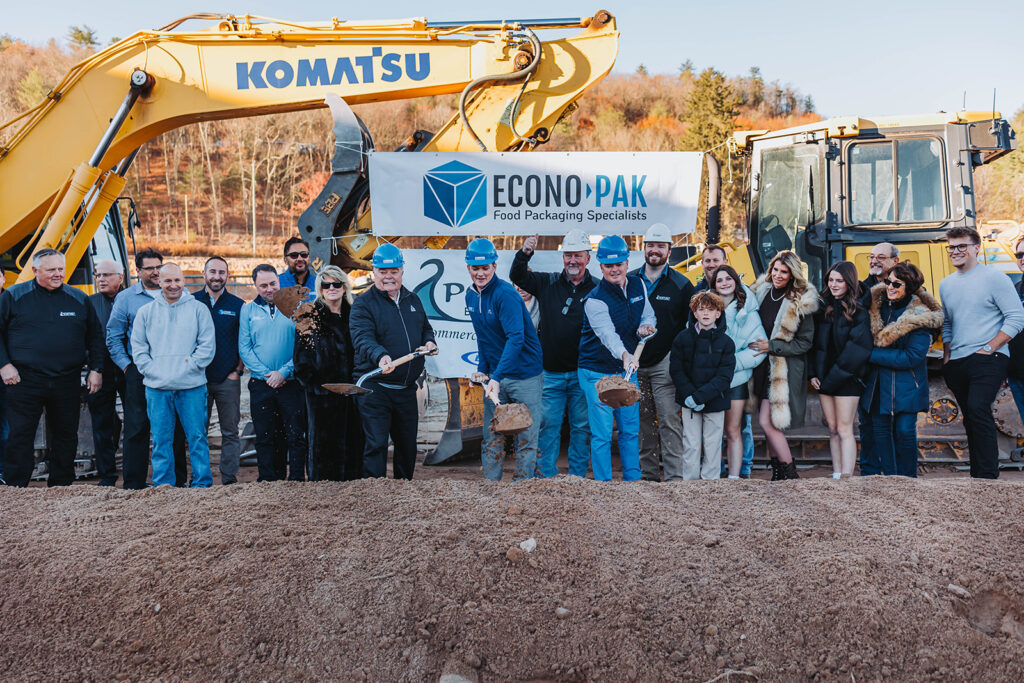

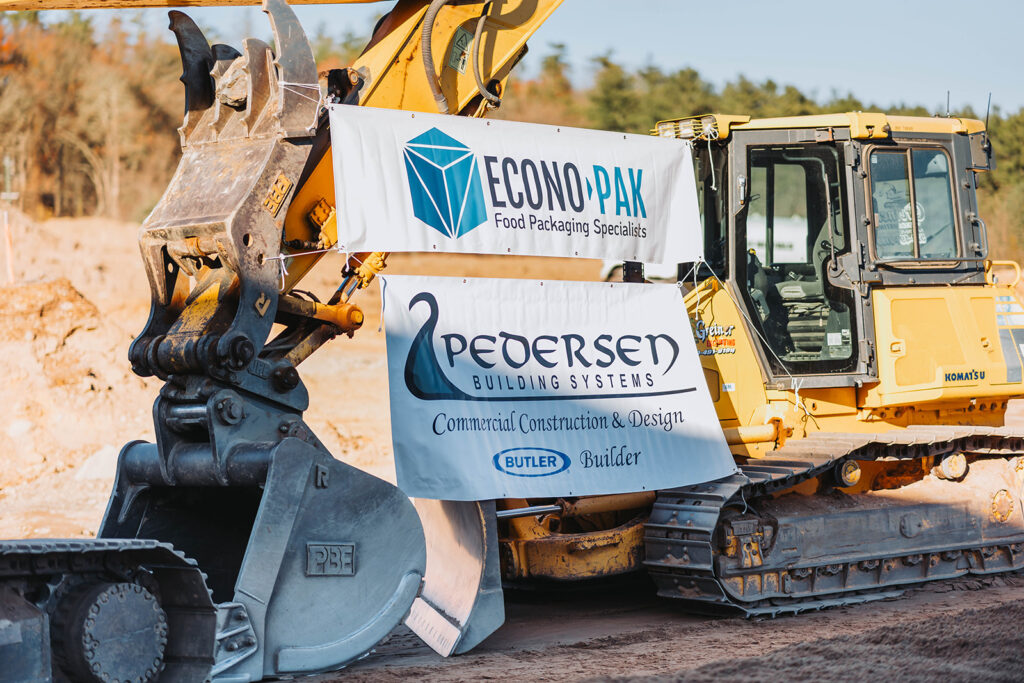

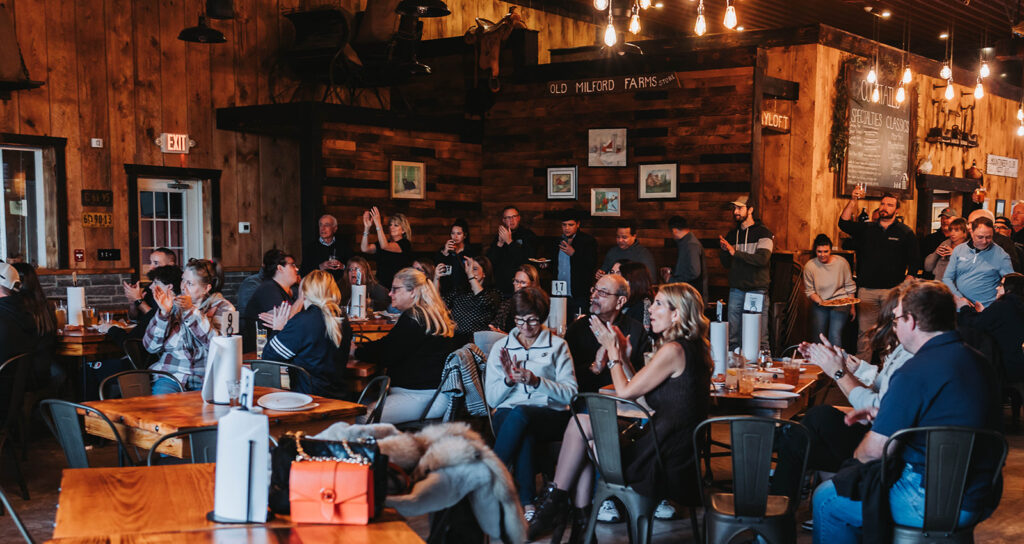

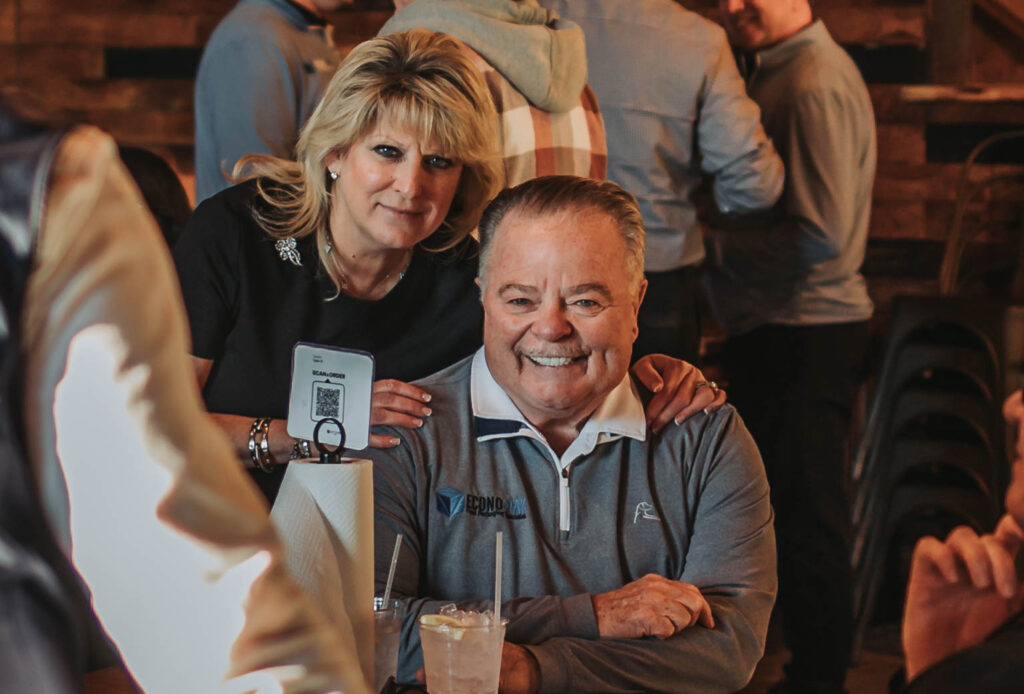
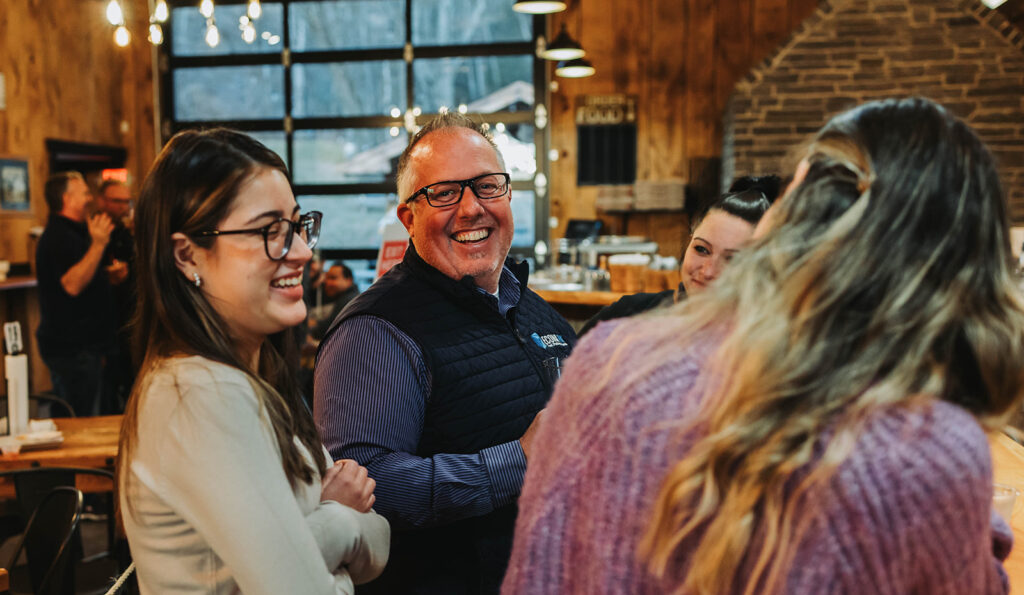

Photo credit: Kayla Rosemary Photography
Experience the excitement of our expansion event in action! We’ve put together a video showcasing key moments from the day, including the ground breaking ceremony and following celebration.
Let's start scaling.
Is your demand outpacing your ability to package your own product? Then consider outsourcing with Econo-Pak.
With over 40 years of experience working with both small brands and Fortune 500 companies, we are capable of handling your specific dry food product.
Get in touch with our team for a fixed-price quote for your project.
What are Induction Seals?
Leave a CommentInduction seals seals not only protect products but also help maintain their quality and extend shelf life.
Let’s examine the benefits that make induction seals an integral part of modern food packaging.
What Are Induction Seals?
Induction seals are thin layers of material applied to containers using electromagnetic induction. This process creates an airtight seal that protects the contents from moisture, air, and other environmental factors.
Key Benefits of Induction Seals for Dry Foods
1. Enhanced Product Freshness
Induction seals create an airtight environment, locking in the freshness of dry foods. This is essential for preserving the flavor, aroma, and texture of products like grains, nuts, spices, and powders.
2. Tamper Evidence
Consumers demand safe, tamper-proof products. Induction seals provide a visible layer of protection, ensuring that the product hasn’t been interfered with before purchase. This builds trust and confidence in the brand.
3. Leak Prevention
Dry foods, though solid, can create dust or crumbs that lead to spills during transit. Induction seals effectively contain these particles, preventing leaks and maintaining cleanliness in the supply chain.
4. Extended Shelf Life
By creating a barrier against moisture and oxygen, induction seals help extend the shelf life of dry foods. This reduces waste for retailers and consumers while maintaining product quality over time.
5. Improved Consumer Confidence
Professional, sealed packaging creates a positive impression on consumers. Induction seals show a commitment to safety and quality, which can enhance brand reputation and loyalty.
Cost-Effectiveness in Co-Packing
For co-packers, induction seals streamline the packaging process while minimizing waste. Their ease of application and compatibility with automated production lines lead to faster output and lower costs. Additionally, fewer damaged goods mean savings for both manufacturers and retailers.
Sustainability Considerations
Many induction seals now utilize eco-friendly materials, contributing to more sustainable packaging solutions. By reducing product loss and spoilage, they also help decrease the environmental impact associated with food waste.
Why Induction Seals Are Essential for Dry Food Packaging
Induction seals have become an essential tool in the co-packing industry, especially for dry foods. They ensure freshness, protect against tampering, and extend shelf life while enhancing consumer trust. For food brands seeking efficient, cost-effective, and sustainable solutions, co-packing with induction seals are a clear winner.
Investing in this technology is more than a packaging upgrade—it’s a commitment to quality, safety, and consumer satisfaction.
Let's start scaling.
Is your demand outpacing your ability to package your own product? Then consider outsourcing with Econo-Pak.
With over 40 years of experience working with both small brands and Fortune 500 companies, we are capable of handling your specific dry food product.
Get in touch with our team for a fixed-price quote for your project.
Sombrero vs. Hole Punches in Packaging
Leave a CommentWhen designing packaging for your products, every detail matters, from the type of material used to the functional elements like holes or punches for easy handling. Two of the most popular punch types in packaging are the sombrero punch and the hole punch.
While both serve essential purposes, each has its own unique advantages and applications.
What Are Sombrero Punches in Packaging?
A sombrero punch, also known as the inverted T punch, is a specialized type of punch used in packaging, characterized by its distinct shape. Named after the iconic Mexican hat, the sombrero punch features a raised circular profile with a reinforced rim, providing added strength and stability.
This design allows for greater durability, particularly when packaging heavier products. Sombrero punches are often used in cases where packages need to support extra weight, such as in food, beverage, or industrial packaging.
Sombrero punches are widely appreciated for their aesthetic appeal and versatility. They offer a clean and professional appearance, often utilized in high-end or premium packaging solutions where both functionality and design are important.
The reinforced rim of the sombrero punch can also improve the overall structural integrity of the packaging, making it a preferred choice for companies looking to enhance both performance and presentation.
What Are Hole Punches in Packaging?
Hole punches, on the other hand, are simpler and more commonly recognized in everyday packaging solutions. These punches are typically round or oval cutouts, often used for hanging or displaying products in retail environments.
They allow for easy placement on hooks or pegs, making hole punches an essential feature in consumer packaging, especially for products like tools, stationery, or small electronics.
The simplicity of hole punches makes them highly cost-effective and efficient for mass production. Businesses looking for basic yet functional solutions often rely on this type of punch in their packaging designs. Due to their minimalistic design, hole punches are widely adopted across various industries, and their application is flexible enough to work with different packaging materials such as cardboard, plastic, or flexible films.
Key Differences Between Sombrero and Hole Punches
The primary difference between sombrero punches and hole punches lies in their structure and purpose. Sombrero punches are more robust, offering enhanced strength with their reinforced rim, while hole punches are simple cutouts that serve as lightweight, cost-efficient options. In terms of design, sombrero punches offer a more refined and finished look, making them a better choice for premium products, whereas hole punches are more suitable for high-volume, budget-conscious packaging designs.
Another notable difference is in how each punch performs under stress. Sombrero punches, thanks to their raised edges, distribute weight more evenly across the packaging, reducing the risk of tearing when heavy items are involved. In contrast, hole punches may be more prone to damage when handling heavier or bulkier products. As such, companies need to consider the weight and fragility of their products when choosing between the two.
How to Choose the Right Option for Your Packaging Needs
When selecting between sombrero and hole punches, consider these factors:
- Product type and weight:
- Heavy or delicate items may benefit from the durability of sombrero punches.
- Lighter products are often fine with simpler hole punches.
- Target audience:
- Luxury and premium markets might prefer the refined look of sombrero punches.
- Practical, budget-focused packaging can leverage hole punches.
- Brand goals:
- Brands emphasizing quality and presentation can use sombrero punches for added appeal.
- Brands that prioritize simplicity and cost-effectiveness may lean towards hole punches.
Let's start scaling.
Is your demand outpacing your ability to package your own product? Then consider outsourcing with Econo-Pak.
With over 40 years of experience working with both small brands and Fortune 500 companies, we are capable of handling your specific dry food product.
Get in touch with our team for a fixed-price quote for your project.
How Contract Filling Services Support Food Product Expansion
Comments Off on How Contract Filling Services Support Food Product ExpansionExpanding a food product line into new markets or scaling production to meet growing demand requires careful planning and precise execution. One crucial aspect often overlooked is the packaging process, specifically the filling stage, where your product is measured, filled into containers, and prepared for distribution.
Contract filling services play a pivotal role in ensuring this process runs smoothly, efficiently, and cost-effectively, allowing food companies to focus on growth.
Packaging Configurations for Dry Food Products
When working with contract filling services, especially for dry food products like pretzels, hard candy, cookies, and similar items, the flexibility of packaging configurations is a major advantage.
A well-equipped co-packer can offer a variety of packaging formats to meet the needs of different markets, retailers, and consumer preferences. Here are some common configurations available for dry foods:
Bags and pouches: Ideal for snacks like pretzels, chips, or cookies, flexible packaging options such as bags and pouches are popular for their lightweight, resealable features, and efficient shelf space usage. These packages can be customized in various sizes, from single-serve portions to family-sized packs, allowing you to cater to multiple consumer segments.
Rigid containers: For products requiring more structure or protection, such as brittle cookies or candy, rigid containers like plastic tubs, jars, or canisters offer enhanced durability and presentation. They also provide a premium feel, which may be ideal for higher-end or specialty markets.
Bulk packaging: Expanding into club stores like Costco often requires larger, bulk packaging solutions. Contract filling services can fill products into large, durable bags, boxes, or tubs, designed for high-volume sales. This is especially useful for food products like rice, grains, or snacks that are typically sold in larger quantities in these stores.
Multi-packs: Multi-pack configurations, where several single-serve items are grouped together in a larger package, are common for hard candies, snack bars, or individual cookie packs. This type of packaging is popular in convenience stores, supermarkets, and for on-the-go consumers.
Display-ready packaging: Many retail environments require display-ready packaging (also known as shelf-ready packaging). These packages are designed for easy stocking and immediate shelf placement, making it simple for retailers to display your product while reducing labor costs. Co-packers can assist with these specialized configurations that combine function and marketing appeal.
Leveraging a contract filling service for these varied packaging configurations allows your brand to maintain flexibility and adapt quickly to new sales channels or consumer preferences.
The ability to offer different package types can also open doors to new markets, including club stores, supermarkets, convenience stores, and even online retailers.
1. Efficiency in Production and Packaging
Contract filling services provide the expertise and machinery necessary to fill large volumes of food products quickly and consistently. For growing food businesses, investing in high-capacity filling equipment is expensive and often unnecessary when a third-party co-packer can offer these capabilities as part of their service. By outsourcing this aspect of production, food companies can scale up their operations without overextending their resources.
The ability to fill products efficiently ensures that you can meet consumer demand without compromising on quality or lead times—two critical factors in maintaining brand reputation during expansion.
2. Flexibility for Various Product Types
Contract filling services offer flexibility in packaging formats, enabling food brands to experiment with different types of packaging that best suit their products and target markets. Whether it’s dry foods, powders, liquids, or viscous products, a co-packer with diverse filling capabilities allows you to easily adapt to market trends, try new formats, and cater to different retail channels.
For example, if you’re expanding into club stores like Costco or Sam’s Club, you may need to switch from standard retail packaging to bulk formats. A reliable contract filling service will have the machinery and expertise to accommodate these changes with minimal disruption to your production timelines.
3. Ensuring Quality and Compliance
Food safety regulations and quality control are vital to any food business, and expanding into new markets means adhering to different sets of standards. Contract filling services not only bring efficiency but also ensure that every product filled meets food safety regulations, including certifications like SQF (Safe Quality Food) and GMP (Good Manufacturing Practices).
A professional filling service will have stringent quality control measures in place, ensuring that each product is filled accurately and safely, reducing the risk of recalls, contamination, or non-compliance penalties, which can severely impact both reputation and finances.
5. Focus on Core Competencies
By entrusting contract filling services with the technical and operational complexities of packaging, food companies can concentrate on what they do best—developing innovative products, building relationships with retailers, and expanding their brand presence.
This division of labor frees up internal resources and allows your team to focus on strategic initiatives that drive long-term growth rather than getting bogged down in day-to-day packaging logistics.
Contract Filling with Econo-Pak
For food brands aiming to expand into new markets or scale their product lines, contract filling services from Econo-Pak provide an efficient, flexible, and cost-effective solution. By outsourcing the filling process to us, you not only streamline production but also ensure that your products meet the highest quality and safety standards. This partnership ultimately supports your growth by allowing you to focus on innovation, market expansion, and customer satisfaction.
With Econo-Pak, your brand can confidently scale to meet new opportunities without compromising on quality or efficiency.
Let's start scaling.
Is your demand outpacing your ability to package your own product? Then consider outsourcing with Econo-Pak.
With over 40 years of experience working with both small brands and Fortune 500 companies, we are capable of handling your specific dry food product.
Get in touch with our team for a fixed-price quote for your project.
The Rise of Food-Grade Pet Foods
Comments Off on The Rise of Food-Grade Pet FoodsIn recent years, pet owners have become increasingly conscious of what goes into their pets’ food. This shift towards healthier, high-quality options has given rise to food-grade pet foods—products made from ingredients fit for human consumption. As consumers demand better nutrition for their pets, the market for premium pet food continues to expand.
For emerging brands, the challenge lies in meeting this demand while scaling operations to compete in major retail chains like Costco, Walmart, and pet store chains. One of the most effective strategies for overcoming this challenge is outsourcing co-packing services.
What Are Food-Grade Pet Foods?
Food-grade pet foods go beyond traditional pet food formulations by using ingredients that meet human food standards. These products are made with real meats, vegetables, and grains, often free from artificial additives, preservatives, and by-products.
The trend mirrors the movement toward organic and whole foods in human diets, as consumers seek the same level of care for their pets’ nutrition. Pet owners are willing to pay a premium for these products, opening doors for brands to thrive in a growing market.
Why Scaling Is Essential
For small to medium-sized pet food brands, scaling production is crucial to capitalizing on the demand for food-grade pet products. However, this growth is not without its challenges.
As you attempt to enter major retail channels like Costco, Walmart, and pet store chains, the need for consistent quality, larger production volumes, and logistical expertise becomes even more apparent.
This is where outsourcing co-packing becomes an essential component of your growth strategy.
The Benefits of Co-Packing for Scaling Food-Grade Pet Foods
1. Increased Production Capacity
A co-packing partner can help you scale your production to meet large retail orders without the need for heavy capital investment in new machinery or larger facilities. As food-grade pet foods require specific handling practices to meet strict safety and quality standards, a co-packer with experience in this area can ensure compliance with all regulations while ramping up production.
2. Consistency in Quality and Safety
Ensuring that every batch of food-grade pet food meets the same high standards can be difficult, especially as you expand. A reputable co-packing partner is equipped with quality control measures and food safety practices that ensure consistent, safe, and high-quality output, no matter the scale of production.
This becomes even more crucial as you prepare to enter larger markets with more rigorous standards.
3. Cost Efficiency and Flexibility
Scaling operations often requires significant upfront investment, from machinery to labor. Outsourcing to a co-packer can eliminate much of this financial burden, offering a more predictable cost structure.
This allows your brand to allocate resources to marketing, product development, and distribution. Co-packing also provides the flexibility to scale up or down based on demand, making it easier to adapt to changing market conditions.
4. Expanding into New Markets
Outsourcing co-packing can be the gateway to breaking into large-scale retailers like Costco and Walmart. These retailers expect brands to meet high production quotas without sacrificing quality or consistency.
With a co-packing partner, you can confidently approach these major players, knowing that your supply chain is strong enough to handle their demands.
Additionally, pet store chains have increasingly turned to premium, niche brands as part of their product offering to cater to health-conscious pet owners. A co-packer can help you ensure that your product meets the specific requirements of these stores, from packaging and labeling to meeting the pet food safety standards of the Association of American Feed Control Officials (AAFCO).
5. Faster Time to Market
Launching new products or expanding existing lines into new markets can be time-consuming if you’re handling production in-house. A co-packing partner can streamline this process, providing the equipment, expertise, and workforce to produce and package your food-grade pet products quickly.
With faster time to market, you can seize opportunities in competitive retail spaces before your competitors do.
Econo-Pak: Your Partner in Co-Packing Food-Grade Pet Foods
At Econo-Pak, we specialize in scaling food-grade products, including pet foods, by offering comprehensive co-packing services designed to meet the highest standards of quality and safety.
Whether you’re preparing to enter Costco or looking to expand into specialized pet store chains, our expertise in handling high-volume orders and maintaining consistency will help you scale your brand efficiently and effectively.
Our fixed-cost pricing model also provides predictable budgeting, allowing you to focus on growth without worrying about fluctuating production costs.
As a trusted partner, Econo-Pak can help your pet food brand reach its full potential in the competitive retail landscape.
Outsource to Econo-Pak to scale your brand
The demand for food-grade pet foods shows no signs of slowing down. Brands that can scale efficiently, maintain quality, and meet retailer demands will be well-positioned to capture market share in this growing industry.
By partnering with an experienced co-packer like Econo-Pak, your brand can navigate the challenges of scaling production and make a successful leap into major retail markets.
Ready to take your food-grade pet food brand to the next level? Contact us today to learn how co-packing can support your growth.
Let's start scaling.
Is your demand outpacing your ability to package your own product? Then consider outsourcing with Econo-Pak.
With over 40 years of experience working with both small brands and Fortune 500 companies, we are capable of handling your specific dry food product.
Get in touch with our team for a fixed-price quote for your project.
How Sequencing SKUs in Food Co-Packing Reduces Costs and Boosts Efficiency
Comments Off on How Sequencing SKUs in Food Co-Packing Reduces Costs and Boosts EfficiencyIn food co-packing, efficiency is key to managing costs and meeting production deadlines. One powerful tool to achieve this is sequencing, a process that allows for running multiple SKUs in succession with only partial cleanings between each.
This method can streamline production, reduce costs, and help you hit higher volumes without the time and expense of full machine tear-downs and deep cleaning after every SKU change.
What is sequencing in food co-packing?
Sequencing is the process of scheduling SKUs to run one after the other on the same equipment, with minimal cleaning between them.
For this to work, the SKUs must have similar ingredients and no conflicting allergens. For instance, imagine a project with three different protein powders: plain, vanilla, and vanilla with raspberry. These would be sequenced in that order, with partial cleanings between each run.
This approach minimizes downtime and avoids the need for complete sanitization between SKUs, allowing for a quicker, more cost-efficient production process.
Quality assurance and sequencing
While sequencing reduces the need for full cleaning between SKUs, rest assured that all necessary quality controls and safety protocols are followed at every step. Even with partial cleanings, we maintain strict standards to ensure the integrity of both the machinery and your product. Our team carefully evaluates each SKU to confirm compatibility for sequencing, especially regarding allergens and ingredient overlap.
Throughout the sequencing process, we implement thorough inspections and follow all regulatory guidelines to ensure your product meets the highest safety and quality standards. This ensures your product is not only packaged efficiently but also handled with the utmost care and precision.
Learn more about Econo-Pak’s certifications and our commitment to quality and food safety across the supply chain.
How sequencing benefits your project
For many clients, sequencing enables them to reach production volumes that justify the use of automated equipment. The alternative—running smaller batches with full cleanings between each SKU—often doesn't make financial sense. By sequencing similar SKUs, you can run more product without needing to significantly extend production time.
A full cleaning between SKUs can be labor-intensive and time-consuming, particularly for large-scale runs. Sequencing minimizes the labor involved in changeovers and cleaning, which in turn reduces the cost of production. This leaner, more efficient process translates into lower quotes for you.
Since sequencing cuts down on cleaning and changeover times, your overall production moves faster. This can make a big difference when tight deadlines are involved, allowing your products to reach the market more quickly.
Is sequencing right for your project?
Not all products are suited for sequencing, and it’s important to work with a co-packer who can assess whether this approach will benefit your project. If your SKUs share common ingredients and don’t have allergen conflicts, sequencing can significantly streamline your production, reduce costs, and help you get more product out the door in less time.
If you’re working with complex or highly varied dry food products that don’t share common ingredients, sequencing may not be a viable option. In these cases, full cleanings between SKUs are necessary to prevent contamination, particularly when dealing with allergens.
Maximize efficiency with smart sequencing strategies
Sequencing is a smart strategy for co-packing projects with similar products. By reducing the need for full cleanings between runs, this approach can lower costs, improve production efficiency, and enable larger production volumes. As a result, you can keep your budget in check while hitting your production goals—without sacrificing safety or quality.
By collaborating with a co-packing partner who understands how to optimize sequencing, you can unlock the full potential of your production line and see meaningful savings in time and cost.
Let's start scaling.
Is your demand outpacing your ability to package your own product? Then consider outsourcing with Econo-Pak.
With over 40 years of experience working with both small brands and Fortune 500 companies, we are capable of handling your specific dry food product.
Get in touch with our team for a fixed-price quote for your project.
Unlocking U.S. Market Success for International Food Companies with Econo-Pak
Comments Off on Unlocking U.S. Market Success for International Food Companies with Econo-PakThe U.S. market is one of the most lucrative and competitive spaces for international food and snack companies. However, entering this market comes with its own set of challenges, from navigating stringent regulations to understanding consumer preferences.
A reliable co-packer like Econo-Pak can be instrumental in helping international brands overcome these hurdles and establish a strong foothold in the U.S. market.
Understanding the U.S. Food Market
The U.S. food and snack market is diverse, with consumers showing a strong preference for convenience, quality, and innovation. The regulatory environment, governed by agencies such as the FDA (Food and Drug Administration) and USDA (United States Department of Agriculture), imposes strict standards that all food products must meet before they can be sold.
Additionally, consumer expectations are high, with an increasing demand for transparency in labeling, organic options, and unique flavors that cater to various dietary needs.
Challenges for International Food Companies
Entering the U.S. market as an international food company involves more than just exporting products. There are several challenges that need to be addressed:
Navigating complex U.S. regulations: International companies must comply with a range of U.S. regulations, including those set by the FDA and USDA. These regulations cover everything from food safety standards to specific ingredient restrictions.
Meeting FDA and USDA standards: Ensuring that products meet the stringent standards of these regulatory bodies is crucial. Non-compliance can result in significant fines or product recalls.
Addressing labeling and packaging requirements: U.S. consumers expect clear and accurate labeling, including nutritional information, ingredient lists, and allergen warnings. Packaging must also adhere to specific guidelines to ensure safety and shelf life.
Overcoming supply chain hurdles: Managing the logistics of importing goods, including customs clearance and distribution, can be complex and costly.
Cultural and consumer preference differences: Understanding the local market and adapting products to meet U.S. consumer preferences is essential for success.
The Role of Co-Packers in Market Entry
Co-packers play a pivotal role in helping international food companies navigate the complexities of the U.S. market. A co-packer like Econo-Pak can handle everything from packaging to compliance, allowing companies to focus on their core business. Some of the benefits of using a co-packer include:
Streamlined operations: Co-packers manage the packaging process, ensuring that products are packaged efficiently and in compliance with U.S. regulations.
Cost-effectiveness: Outsourcing packaging to a co-packer can be more cost-effective than setting up a dedicated packaging facility, especially when scaling production to meet U.S. demand.
Scalability: Co-packers can quickly adapt to changes in demand, allowing companies to scale their operations without significant capital investment.
Why Choose Econo-Pak as a Co-Packer?
Econo-Pak is a premier co-packer offering comprehensive packaging solutions tailored to the needs of international food and snack companies. Some of the key advantages of partnering with Econo-Pak include:
Extensive services: Econo-Pak provides a wide range of packaging services, including contract food packaging, high-volume co-packing, and custom packaging solutions. Whether it’s flow wrapping, stand-up pouches, or variety packs, we have the expertise to handle diverse packaging needs.
Compliance with U.S. Standards: Econo-Pak is fully certified and compliant with U.S. regulations, ensuring that your products meet all necessary standards. This includes FDA, USDA, and other critical certifications required for the U.S. market.
Proven track record: Econo-Pak has a history of successful partnerships with international brands, helping them to navigate the complexities of the U.S. market and achieve commercial success.
Econo-Pak’s U.S. Certifications and Audits
For any international food company, ensuring that products meet U.S. regulatory standards is a top priority. Econo-Pak holds all the necessary certifications, including those from the FDA, USDA, and GFSI (Global Food Safety Initiative). These certifications not only ensure compliance but also build trust with U.S. consumers who expect the highest levels of food safety.
The audit process at Econo-Pak is rigorous, with regular inspections and updates to maintain compliance with evolving U.S. regulations. This ensures that all products packaged at Econo-Pak meet or exceed the standards required by U.S. law, reducing the risk of non-compliance and enhancing the overall safety and quality of your products.
Overcoming Regulatory Hurdles with Econo-Pak
Navigating the complex regulatory environment in the U.S. can be daunting for international companies. Econo-Pak’s extensive experience with FDA and USDA regulations makes them an ideal partner for ensuring that your products are fully compliant. They assist with everything from ingredient approvals to final product labeling, ensuring that your product is ready for the U.S. market.
Econo-Pak also offers custom contract food packaging solutions that not only comply with U.S. regulations but also cater to consumer expectations. This includes meeting specific labeling requirements, providing clear nutritional information, and ensuring that packaging is both functional and appealing to the U.S. consumer.
Tailored Solutions for Different Market Segments
Different market segments in the U.S. require tailored packaging solutions, and Econo-Pak is equipped to meet these diverse needs. Whether your products are destined for retail, e-commerce, or food service, Econo-Pak provides packaging options that align with the requirements of each segment.
For instance, retail products might require eye-catching packaging with clear branding and nutritional information, while e-commerce packaging needs to be robust enough to withstand shipping. Econo-Pak also specializes in co-packing for niche markets, such as organic or gluten-free products, ensuring that your products stand out in a crowded market.
Econo-Pak’s Technological Capabilities
One of the key advantages of partnering with Econo-Pak is our advanced technological capabilities. We use highly efficient automation systems to ensure high speeds and consistency in the packaging process. This technology allows Econo-Pak to handle high-volume orders with precision, ensuring that every package meets the highest standards of quality.
We’re here to help.
Entering the U.S. market as an international food or snack company is no small feat, but with the right partner, it can be a smooth and successful process. Econo-Pak offers the expertise, certifications, and technological capabilities necessary to help your brand navigate the complexities of the U.S. market. By choosing Econo-Pak as your co-packer, you can focus on what you do best—creating quality products—while they handle the packaging, compliance, and logistics.
If you’re looking to enter the U.S. market, consider partnering with Econo-Pak for a seamless and compliant entry. Contact us today to learn more about how they can help your brand succeed in the U.S. market.
Let's start scaling.
Is your demand outpacing your ability to package your own product? Then consider outsourcing with Econo-Pak.
With over 40 years of experience working with both small brands and Fortune 500 companies, we are capable of handling your specific dry food product.
Get in touch with our team for a fixed-price quote for your project.
In-House Packaging vs. Co-Packing Food Products
Comments Off on In-House Packaging vs. Co-Packing Food ProductsWith packaging your food product, you have two options: you can keep the packaging process in-house or outsource it to a co-packer.
So how do you know which is best for your business?
How Robotic Automation Improves Contract Food Packaging
Comments Off on How Robotic Automation Improves Contract Food PackagingRobotic automation has changed the game when it comes to contract food packaging by completely transforming the way we do business.
Improvements to automated tech, like reduced costs, higher speeds, and better gripping machinery, have led to the food co-packing industry’s widespread adoption of robots and automated machinery.
Robotic automation in contract food packaging
Sensors, machine vision systems, and sophisticated software that enable packaging robots to perceive and interact with their environment make automated food packaging possible.
These capabilities expand further with the integration of machine learning and artificial intelligence. AI can help food-packing robots adapt to changing conditions and learn from experiences over time.
The growing list of robotic capabilities can help improve any food manufacturer’s overall packaging process and efficiency.
Benefits of robotic packaging automation in co-packing
The benefits of automation and using robots in food packaging and manufacturing are significant. For example:
- Robots produce faster and more consistent work than humans. This can result in the production of uniform products with fewer errors.
- Robots can handle repetitive tasks well. This means companies don’t have to rely on manual labor as much. Instead, they can hire workers for more skilled roles that require a human touch.
- Robotic automation can provide long-term savings. It does require upfront expenses to purchase this machinery, but overtime, it can reduce operational labor costs. This makes it a worthy investment.
- Robots are more sanitary. They don’t carry the same germ-related risks as humans do. They operate in a more controlled way to reduce contamination incidents and improve food safety compliance.
- Robotic automation can be an eco-friendlier option. Because automation can improve productivity, they reduce material waste. This makes them a sustainable choice for contract food packaging companies like Econo-Pak.
Pick-and-place robots, fully automated packaging systems, or anything in between can help manufacturers improve their operations, save money, reduce risk, and minimize waste.
Econo-Pak’s food co-packing and co-manufacturing equipment
At Econo-Pak, we own over 200 of the best co-packing and co-manufacturing machines so we can proudly provide our clients with automated production output.
We own machines from brands like Adco, Alpha, Bosch, Campbell, Ceco, Langan, Lock, Ohlson, Sesotech, Tishma, Viking, Weighpack, Yamato, and many others.
Types of machinery:
- Augers
- Blenders
- Cartoners
- Check weighers
- Cup fillers
- Flow wrappers
- Inline printing
- Metal detection
- Premade SUP machines
- Rollstock machines
- Seasoners
- VFFS baggers
- X-ray
And the list doesn’t stop there. Explore our food co-packing equipment to see how we can help you outsource your packaging needs.
Request a quote today to learn how Econo-Pak’s contract food packaging services can unlock new levels of automated productivity and boost your business’s bottom line.
Let's start scaling.
Is your demand outpacing your ability to package your own product? Then consider outsourcing with Econo-Pak.
With over 40 years of experience working with both small brands and Fortune 500 companies, we are capable of handling your specific dry food product.
Get in touch with our team for a fixed-price quote for your project.
